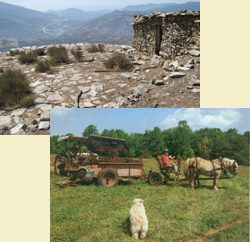Agriculture, Northland Sheep Dairy
Watering the Garrotxes: donkey farming in the French Pyrénées
Thursday, March 7th, 2024A region of distinction in decline
French Catalonians commonly call their region Roussillon, but as one ascends from the coastal plain that stretches from the city of Narbonne to the Spanish border, first into the foothills, then into the narrow, steep-sided Tet river valley known as the Conflent, different landscapes take on different names. The last [...]
An agroecological model for the end of the oil age
Monday, August 14th, 2023Introduction
Modern civilization is urban down to its rural roots, hates nature, ignores nature, depends on nature, destroys nature, yet expects nature to keep on giving. Now nature is striking back. The result is a slow-motion tragedy of catabolic collapse[1], like the oroboros tail-eating snake. To withstand the collapse, a revolution in food production [...]
Farm restoration – a Downeast Maine story
Tuesday, February 9th, 2021More a set of recalled vignettes than a systemic history, this essay will at least capture some of my photo archive in an explanatory framework.
Property purchase and rebuilding
As we drove up to the top of Ridge Rd. in Robbinston to the last visit on our hunt for a retirement farm in Maine, the vista that [...]
The quality of peasant life: a scenario for survival
Tuesday, November 17th, 2020Histories of peasant life that characterize it as nasty, brutish and short ignore the vast variety around the world of peasant quality of life and attendant differences in environment, social organization and culture. Differences of degree of overlordship alone range from several layers of overlords to complete autonomy. It is just this great variety, the [...]
Human designs for ecosystem management and survival after the oil era
Saturday, January 18th, 2020All societies in history have relied on the land and its plant and animal resources. The superstructure of high technologies and complex forms of social organization like cities that fossil energy has made possible only conceal our essential reliance on the land. As access to the dense, high quality forms of energy in fossil fuels [...]
The Peasants Shall Inherit the Earth
Thursday, August 30th, 2018It is said that prediction is difficult, especially about the future. Nonetheless, a few Romans saw the inevitable fall of the Roman Empire more than a hundred years before it completely disappeared. Their prediction was possible because they saw that the system was depleting resources essential to its survival, so had trapped itself into a [...]
Mass deception and the quest for a more sustainable agriculture
Friday, February 16th, 2018Most of our society has fallen victim to a spectacularly successful, century-long effort of mass deception. The idea that organically certified farming is making a significant difference is just one of the many myths. To explain how that happens, I will first sketch a more general, historical picture that provides the necessary context.
The advent of [...]
What is Sustainable?
Monday, January 8th, 2018Answers to this question that are rooted in the relevant scientific disciplines – primarily systems ecology, the physics and economics of natural resource science and the world-system method of the history of civilizations – are so unsettling to most people in their implications for the future of modern civilization that they are met with denial. [...]
Biochar – a Critical View Through the Ecosystemic Lens
Monday, October 30th, 2017I have been following the biochar story since it began to gain visibility over a decade ago. I view it from the perspective of forty years of farming informed by study of systems ecology. My understanding of both of these pursuits has evolved over that time in ways that will inform this critique. I began [...]
Food Production Systems in the Decline of the Industrial Age: A Call for a Socio-ecological Synthesis
Sunday, June 9th, 2013The sustainability of industrial food production has long been under attack for its destruction of the soil, water, air and other products and services essential to life on earth. Now the massive consumption of energy and other resources needed to build and maintain industrial society has led to the depletion of these [...]
« Previous Entries